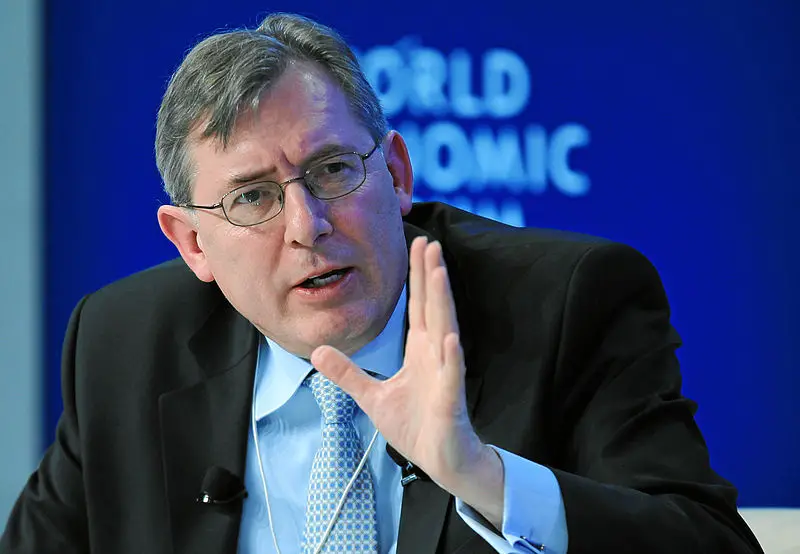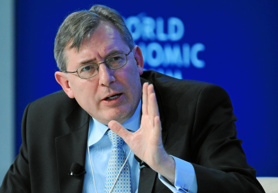Source: People’s Daily
“We have had great engagement and participation from taskforce members this year,” said Hans-Paul Bürkner, chairman of the Boston Consulting Group, when speaking about this year’s Business 20, or B20 summit.
“We have seen encouraging signs through the G20 Finance Ministers and Central Bankers' communiqué as well as on the sidelines of the July G20 Trade Ministers meeting and look forward to a successful Hangzhou Summit in September,” he noted.
Hans-Paul said the infrastructure taskforce has been lucky to have the privilege of interacting more closely with G20 working groups and presenting at G20 ministers' meetings, which he said has helped the B20 become more closely aligned with the overall G20 agenda, get input on key emerging ideas from the B20 and ultimately better support its G20 counterparts.
“Chinese companies and business leaders have been very active this year. We have received strong leadership from the taskforce chair, as well as support from dedicated Sinomach, Sinopec, SPIC and State Grid working teams,” Bürkner said, when speaking about the role of Chinese companies in developing the B20 Infrastructure taskforce’s policy recommendations.
“As China plays an increasingly important role in the global economy, we believe the increasing involvement of Chinese companies is an important trend for the future in infrastructure and other topics,” he added.
Bürkner stressed the importance of five recommendations put forward by the taskforce, saying that the recommendations “reinforce the fundamentally critical ‘evergreen’ B20 actions from previous years,” and “identify new opportunities.”
“If implemented, these five recommendations could generate more than $2 trillion in economic activity every year and create more than 30 million additional jobs across the G20 economies,” he noted.
Bürkner particularly emphasized the first two recommendations – increasing and accelerating the pipeline for high-quality bankable projects; and the need to develop conducive regulations, deploy asset-monetization strategies and promote the creation of financial instruments necessary to unlock long-term investments in infrastructure. He said the first two recommendations represent the most important infrastructure challenges facing the business community today. He also said he is interested in seeing how the global community will start embracing the promise of a digital revolution in the infrastructure industry.
“Governments need a comprehensive strategy owned by the highest decision makers,” Bürkner said.
In addition, Bürkner explained that their policy paper also goes into details about the need to improve the way greenfield projects are identified, prioritized, and prepared. He noted that there are significant opportunities for the organizations that own, plan and operate infrastructure assets (such as transport agencies) to be more agile, identify and implement targeted IT systems, optimize procurement procedures, better manage asset life-cycles, accelerate the delivery of high-priority projects and leverage big data and analytics.
“Only then can governments begin to efficiently and effectively accelerate and increase bankable project pipelines, create conducive regulatory requirements to de-risk infrastructure projects, reap the benefits from brownfield asset monetization and foster digital technology,” Bürkner said.
“We have had great engagement and participation from taskforce members this year,” said Hans-Paul Bürkner, chairman of the Boston Consulting Group, when speaking about this year’s Business 20, or B20 summit.
“We have seen encouraging signs through the G20 Finance Ministers and Central Bankers' communiqué as well as on the sidelines of the July G20 Trade Ministers meeting and look forward to a successful Hangzhou Summit in September,” he noted.
Hans-Paul said the infrastructure taskforce has been lucky to have the privilege of interacting more closely with G20 working groups and presenting at G20 ministers' meetings, which he said has helped the B20 become more closely aligned with the overall G20 agenda, get input on key emerging ideas from the B20 and ultimately better support its G20 counterparts.
“Chinese companies and business leaders have been very active this year. We have received strong leadership from the taskforce chair, as well as support from dedicated Sinomach, Sinopec, SPIC and State Grid working teams,” Bürkner said, when speaking about the role of Chinese companies in developing the B20 Infrastructure taskforce’s policy recommendations.
“As China plays an increasingly important role in the global economy, we believe the increasing involvement of Chinese companies is an important trend for the future in infrastructure and other topics,” he added.
Bürkner stressed the importance of five recommendations put forward by the taskforce, saying that the recommendations “reinforce the fundamentally critical ‘evergreen’ B20 actions from previous years,” and “identify new opportunities.”
“If implemented, these five recommendations could generate more than $2 trillion in economic activity every year and create more than 30 million additional jobs across the G20 economies,” he noted.
Bürkner particularly emphasized the first two recommendations – increasing and accelerating the pipeline for high-quality bankable projects; and the need to develop conducive regulations, deploy asset-monetization strategies and promote the creation of financial instruments necessary to unlock long-term investments in infrastructure. He said the first two recommendations represent the most important infrastructure challenges facing the business community today. He also said he is interested in seeing how the global community will start embracing the promise of a digital revolution in the infrastructure industry.
“Governments need a comprehensive strategy owned by the highest decision makers,” Bürkner said.
In addition, Bürkner explained that their policy paper also goes into details about the need to improve the way greenfield projects are identified, prioritized, and prepared. He noted that there are significant opportunities for the organizations that own, plan and operate infrastructure assets (such as transport agencies) to be more agile, identify and implement targeted IT systems, optimize procurement procedures, better manage asset life-cycles, accelerate the delivery of high-priority projects and leverage big data and analytics.
“Only then can governments begin to efficiently and effectively accelerate and increase bankable project pipelines, create conducive regulatory requirements to de-risk infrastructure projects, reap the benefits from brownfield asset monetization and foster digital technology,” Bürkner said.
 Menu
Menu
 Hans-Paul Bürkner, Cochairman of Infrastructure Taskforce of B20 hopes the five recommendations can be adopted by G20 Hangzhou Summit
Hans-Paul Bürkner, Cochairman of Infrastructure Taskforce of B20 hopes the five recommendations can be adopted by G20 Hangzhou Summit

















